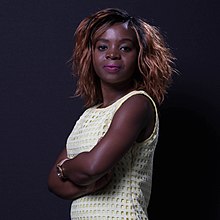Memory Banda, born on September 24 1996, is a Malawian children’s rights activist who has drawn international attention for her work in opposition to child marriage.
Memory began her talk by reciting a poem written by a thirteen-year-old girl she knows, Eileen Piri, entitled “I’ll Marry When I Want.” Memory told the audience that the poem might seem odd written by a girl of her age, but in her home country of Malawi, she called it “a warrior’s cry.” She told the audience how there was a traditional rite of passage in her country in which young girls who have just reached puberty were sent to “initiation camps” to learn how to please men sexually. As part of their initiation, a man visits the camp and the young girls are forced to have sex with him. Many girls end up pregnant or with sexually transmitted diseases, including AIDS.
The 18-year-old girl managed to escape the cycle that turns half the girls in her southern African nation into brides, and often mothers, by her age. But her sister Mercy was not so lucky. When only 11, Mercy got pregnant during a traditional sexual “cleansing ceremony” that is intended to prepare pubescent girls for womanhood and marriage. Mercy was forced to marry the man who impregnated her, but the marriage didn’t last. Nor did the next one. Now 16, Mercy already has three children and little education, her dreams of becoming a teacher put on hold.
Memory chose a different path. She refused to go to the camp. She wanted to continue her education and had dreams of being a lawyer. She became an activist and, with the help of the Girls Empowerment Network (Genet), a group dedicated to ending the practice of forced child marriage in Malawi, she began talking to other young women about their experiences.
At the time (2013/2014), Malawi had the highest rates of child marriage in the world. A 2014 Human Rights Watch report outlined the shocking statistics: one out of two girls in the country on average will be married by her 18th birthday. “In 2010, half of women aged 20 to 24 years were married or in unions before they were 18. Some are as young as 9 or 10 when they are married.” Only 18-years-old, Memory championed a succesful national campaign that culminated in landmark legislation that outlawed child marriage. Memory works with girl leaders to ensure that village chiefs ban child marriage, end sexual initiation practices, enable girls to finish school and live safe from violence in a country where more than half of girls are married as children. Memory became an advocate for girls after her younger sister was forced into marriage at the age of 11. She is now a college student in Malawi. Memory, has been fighting against child marriage and other harmful practices in Malawi since she was a teenager. She is the founder and CEO of Foundation4GirlsLeadership. Internationally, she has delivered speeches on the topic at the UN Commission on the Status of Women, and at the Oslo Freedom Forum. The high prevalence of child marriage in Malawi is driven by deep cultural and religious tradition.
In 2019, even if the law has been in place for nearly five years, Memory said the actual implementation of it is a major challenge. She notes that deeply set traditional beliefs in communities are a huge barrier to overcome in ensuring the law is enforced. “We need to change their mindset, and shift them into a mentality that marrying off a child at a young age is criminal.” She is also calling for assistance for the girls and women who were married, or forced to marry, early, and have now left their marriages, and is urging the Malawian government to address this gap: “They need alternatives, they need vocational skills, they need the education they have missed out on. Ending child marriage is possible only if more is invested in ending it”. “It’s devastating to talk about child marriage in the 21st century”. She concluded. “It is high time governments prioritise girls’ education, promote human rights, and end this tragedy”
Alessia Mazzini 3AL
